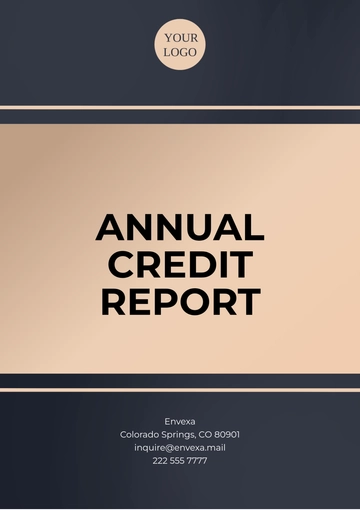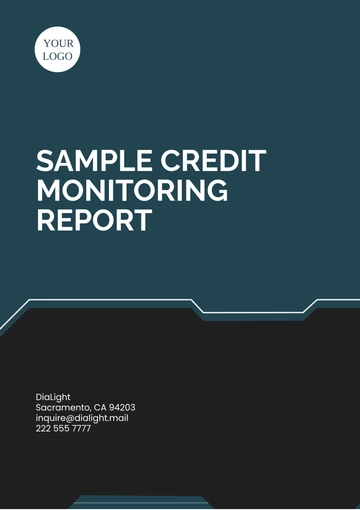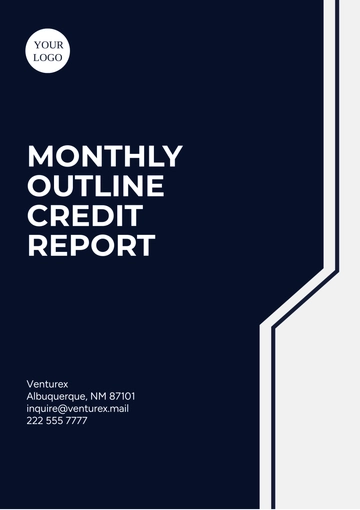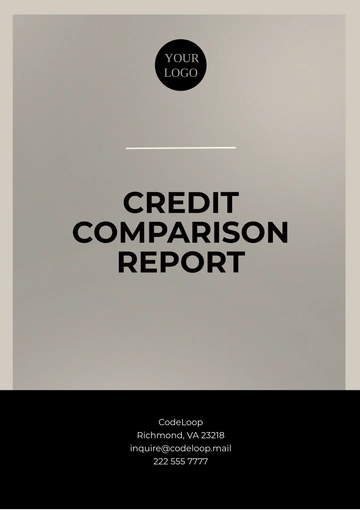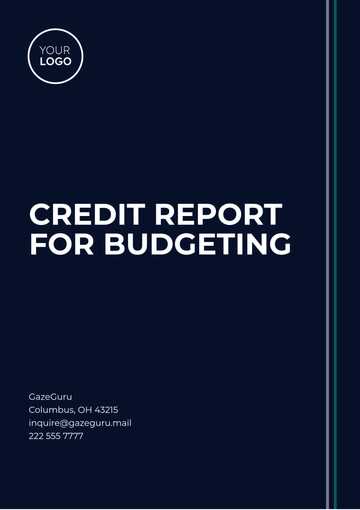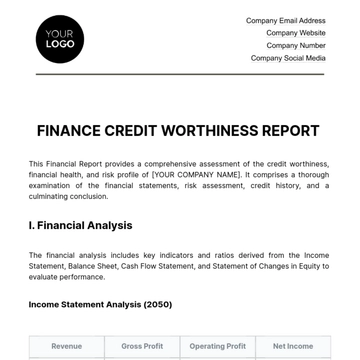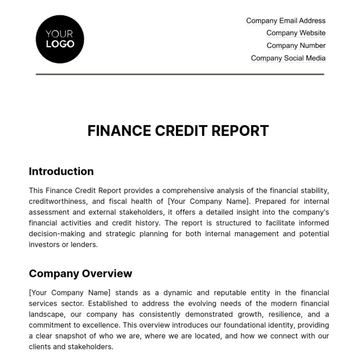Free Credit Report

I. Overview of Credit Reporting
Credit reports are essential financial documents that provide a detailed account of an individual's credit history. These reports are used by lenders, creditors, and other financial institutions to assess creditworthiness and determine terms for borrowing or financing.
A. Definition and Purpose
A credit report summarizes an individual's borrowing and repayment history, gathered from various lenders. It helps in evaluating the credit risk a borrower might pose. Credit reports are integral to making informed financial decisions and are critical in determining interest rates and loan approval.
Purpose | Description |
|---|---|
Credit Evaluation | Assess the financial responsibility of an individual. |
Loan Approval | Determine eligibility for loans or credit lines. |
B. Components of a Credit Report
A typical credit report contains several key sections that help provide a complete financial picture of a consumer. It's important to understand each component when analyzing a credit report.
Personal Information
Credit Accounts
Credit Inquiries
Public Records
II. Understanding Credit Scores
Credit scores are numerical values derived from the credit report that quantify a consumer's credit risk. The scores are crucial for lenders in assessing an individual's likelihood of repaying borrowed funds.
A. Calculation of Credit Scores
Credit scores are generated using complex algorithms that factor in various aspects of a credit report. The most commonly used scoring model is the FICO score, which typically ranges from 300 to 850.
Factor | Impact on Score |
|---|---|
Payment History | 35% |
Credit Utilization | 30% |
Length of Credit History | 15% |
New Credit | 10% |
Credit Mix | 10% |
B. Importance of Maintaining a Good Credit Score
Maintaining a good credit score is crucial for achieving favorable loan terms and interest rates. A higher credit score increases a consumer's credibility in the eyes of lenders, directly influencing financial opportunities.
Better loan approval chances
Lower interest rates
Increased credit limits
III. How to Improve Your Credit Report
Improving a credit report takes diligent financial practices and time. Consumers regularly monitor reports, correct inaccuracies, and adopt responsible credit behaviors to enhance credit profiles.
A. Regular Monitoring and Correction
Consumers should frequently review their credit reports to ensure all information is accurate and up to date. Mistakes can negatively impact credit scores and financial opportunities.
Check reports from all three major bureaus: Experian, TransUnion, and Equifax.
Dispute inaccuracies promptly
B. Responsible Credit Behavior
Adopting responsible financial habits can lead to significant improvements in credit scores over time. Consistent payment of bills on time and prudently managing credit limits are effective strategies.
Pay off outstanding debts.
Avoid unnecessary credit inquiries.
IV. Conclusion
Credit reports are critical tools that impact borrowing terms and access to credit. By understanding report components and credit score factors, consumers can manage their financial health more effectively. Regular monitoring, correcting errors, and responsible credit behavior are key steps to improving creditworthiness and achieving better financial opportunities.
Prepared by:
[YOUR NAME]
[YOUR COMPANY NAME]
[DATE]
- 100% Customizable, free editor
- Access 1 Million+ Templates, photo’s & graphics
- Download or share as a template
- Click and replace photos, graphics, text, backgrounds
- Resize, crop, AI write & more
- Access advanced editor
You may also like
- Sales Report
- Daily Report
- Project Report
- Business Report
- Weekly Report
- Incident Report
- Annual Report
- Report Layout
- Report Design
- Progress Report
- Marketing Report
- Company Report
- Monthly Report
- Audit Report
- Status Report
- School Report
- Reports Hr
- Management Report
- Project Status Report
- Handover Report
- Health And Safety Report
- Restaurant Report
- Construction Report
- Research Report
- Evaluation Report
- Investigation Report
- Employee Report
- Advertising Report
- Weekly Status Report
- Project Management Report
- Finance Report
- Service Report
- Technical Report
- Meeting Report
- Quarterly Report
- Inspection Report
- Medical Report
- Test Report
- Summary Report
- Inventory Report
- Valuation Report
- Operations Report
- Payroll Report
- Training Report
- Job Report
- Case Report
- Performance Report
- Board Report
- Internal Audit Report
- Student Report
- Monthly Management Report
- Small Business Report
- Accident Report
- Call Center Report
- Activity Report
- IT and Software Report
- Internship Report
- Visit Report
- Product Report
- Book Report
- Property Report
- Recruitment Report
- University Report
- Event Report
- SEO Report
- Conference Report
- Narrative Report
- Nursing Home Report
- Preschool Report
- Call Report
- Customer Report
- Employee Incident Report
- Accomplishment Report
- Social Media Report
- Work From Home Report
- Security Report
- Damage Report
- Quality Report
- Internal Report
- Nurse Report
- Real Estate Report
- Hotel Report
- Equipment Report
- Credit Report
- Field Report
- Non Profit Report
- Maintenance Report
- News Report
- Survey Report
- Executive Report
- Law Firm Report
- Advertising Agency Report
- Interior Design Report
- Travel Agency Report
- Stock Report
- Salon Report
- Bug Report
- Workplace Report
- Action Report
- Investor Report
- Cleaning Services Report
- Consulting Report
- Freelancer Report
- Site Visit Report
- Trip Report
- Classroom Observation Report
- Vehicle Report
- Final Report
- Software Report



